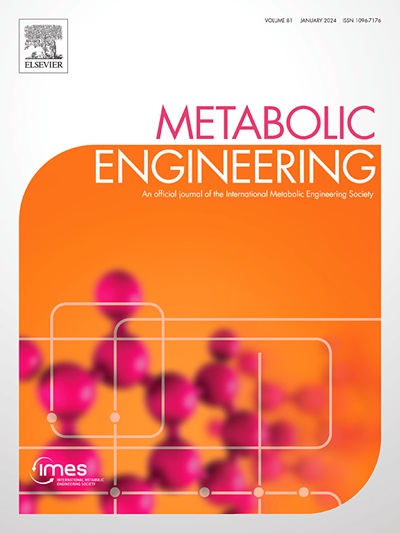提高石油原料利用率,促进高产低碳聚羟基烷酸酯工业生物生产
IF 6.8
1区 生物学
Q1 BIOTECHNOLOGY & APPLIED MICROBIOLOGY
引用次数: 0
摘要
聚羟基烷酸酯(PHAs)是传统塑料的可生物降解和环境可持续替代品,但其采用受到高生产成本和可扩展性挑战的阻碍。本研究采用无偏倚基因组学方法对Cupriavidus necator H16(一种具有PHA生物合成内在能力的工业菌株)进行改造,以提高油基原料(包括食品级棕榈油和粗废食用油)的利用。该工程菌株在PHA生产方面表现出显著的改善,在150 m3的生产规模下,在60小时的饲料分批发酵中实现了264 g/L的产量(提高25.4%)和100 g/g棕榈油的转化率(提高12%),这是我们所知的以食品级棕榈油为碳源的最高产量和转化率。值得一提的是,使用该工程菌株生产PHA的碳足迹减少了29.7%,并且可以通过使用废食用油进一步减少碳足迹。机制研究表明,H16_A3043/H16_A3044双组分系统在调控胁迫响应和生物发生中起核心作用,其缺失解除了调控约束,增加了油脂原料消耗。这种突变,在放大故障排除过程中发现的必要的脂肪酶工程的补充下,在一个健壮的发酵过程中获得了更高的PHA产量,可扩展到0.5 L, 200 L, 15 m3和150 m3。此外,该工程菌株还能有效利用废食用油生产PHA。这项研究将实验室规模的进步与工业可行性联系起来,展示了一种可扩展、可持续、经济可行的生物聚合物生产途径,为全球向循环生物经济的转变做出了贡献。本文章由计算机程序翻译,如有差异,请以英文原文为准。

Enhancing oil feedstock utilization for high-yield low-carbon polyhydroxyalkanoates industrial bioproduction
Polyhydroxyalkanoates (PHAs) are biodegradable and environmentally sustainable alternatives to conventional plastics, yet their adoption has been hindered by the high production costs and scalability challenges. This study employed unbiased genomics approaches to engineer Cupriavidus necator H16, an industrial strain with intrinsic capabilities for PHA biosynthesis, for enhanced utilization of oil-based feedstocks, including food-grade palm oil and crude waste cooking oil. The engineered strain demonstrated significant improvements in PHA production, achieving a 264 g/L yield (25.4 % increase) and a 100 g/g conversion rate of palm oil (12 % increase) in 60-h fed-batch fermentation at 150 m3 production scale, the highest yield and conversion rate using food-grade palm oil as carbon source reported to the best of our knowledge. Notably, the carbon footprint of PHA production was reduced by 29.7 % using the engineered strain, and could be further reduced by adopting waste cooking oil. Mechanistic studies revealed that the H16_A3043/H16_A3044 two-component system plays a central role in regulating stress response and biogenesis, the deletion of which unlocked the regulatory constraint and enhanced oil feedstock consumption. This mutation, supplemented with the necessary lipase engineering as revealed during the scale-up troubleshooting, confered higher PHA production in a robust fermentation process scalable through 0.5 L, 200 L, 15 m3 and 150 m3. Additionally, the engineered strain demonstrated efficient utilization of waste cooking oil for PHA production. This study bridges laboratory-scale advancements and industrial feasibility, demonstrating a scalable, sustainable, and economically viable pathway for biopolymer production, contributing to the global shift toward a circular bioeconomy.
求助全文
通过发布文献求助,成功后即可免费获取论文全文。
去求助
来源期刊

Metabolic engineering
工程技术-生物工程与应用微生物
CiteScore
15.60
自引率
6.00%
发文量
140
审稿时长
44 days
期刊介绍:
Metabolic Engineering (MBE) is a journal that focuses on publishing original research papers on the directed modulation of metabolic pathways for metabolite overproduction or the enhancement of cellular properties. It welcomes papers that describe the engineering of native pathways and the synthesis of heterologous pathways to convert microorganisms into microbial cell factories. The journal covers experimental, computational, and modeling approaches for understanding metabolic pathways and manipulating them through genetic, media, or environmental means. Effective exploration of metabolic pathways necessitates the use of molecular biology and biochemistry methods, as well as engineering techniques for modeling and data analysis. MBE serves as a platform for interdisciplinary research in fields such as biochemistry, molecular biology, applied microbiology, cellular physiology, cellular nutrition in health and disease, and biochemical engineering. The journal publishes various types of papers, including original research papers and review papers. It is indexed and abstracted in databases such as Scopus, Embase, EMBiology, Current Contents - Life Sciences and Clinical Medicine, Science Citation Index, PubMed/Medline, CAS and Biotechnology Citation Index.
 求助内容:
求助内容: 应助结果提醒方式:
应助结果提醒方式:


